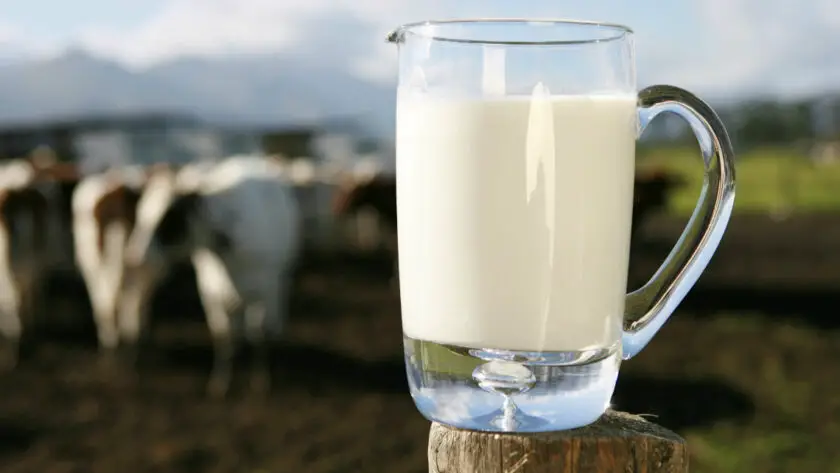Throughout my life, I was taught that drinking unpasteurized raw milk was dangerous, and could even kill you. We are now finding out that this information may be far from the truth.
According to Real Food Consumer Coalition (RFCC), when drinking raw milk you’re assuming the same (if not less) risk than you would for any item from the grocery store. In fact, to date, there have been more cases of health issues reported from pasteurized milk than raw milk.
If you’re wondering, what is raw milk? It is milk that has not been pasteurized. Pasteurization is the process of partially sterilizing food or drink using mild heat.
Pasteurization was put into place to destroy disease carrying germs and to prevent spoiling. Unfortunately, that heating process also kills the beneficial lactobacilli that produce vitamin K2, improve absorption of nutrients, and normalize gut function.
It also turns the sugar of milk, known as lactose, into beta-lactose — which is far more soluble and therefore more rapidly absorbed in the system, so those consuming the pasteurized milk will become hungry again. Lastly, pasteurization makes the calcium contained in raw milk insoluble. This frequently leads to rickets, bad teeth, and nervous tremors.
With the information above proven by science, raw milk is still a high topic of debate within the health (and political) community due to its potential benefits and risks. The benefits attributed to raw milk are not universally agreed upon, and scientific research is ongoing.
Health Benefits Associated With Raw Milk Consumption:
- Nutrient Content: Proponents of raw milk claim that it retains more of its original nutrient content compared to pasteurized milk. It may contain higher levels of vitamins, minerals, enzymes, and beneficial bacteria. However, the extent of these differences can vary based on factors like cow breed, diet, and handling practices.
-
Probiotics: Raw milk is often touted as a source of beneficial bacteria, including probiotics, which can support gut health and the immune system. These bacteria are believed to help maintain a balanced gut microbiome and potentially improve digestion.
Learn How To Make Probiotics In Your Own Kitchen For Pennies On The $$$, Click Here!
- Enzymes: Raw milk contains enzymes that are naturally present and that some believe can aid in digestion and nutrient absorption. However, these enzymes are sensitive to heat and may be destroyed during pasteurization.
- Lactase: Some individuals who are lactose intolerant report being able to tolerate raw milk better than pasteurized milk. This could be due to the presence of lactase enzymes and beneficial bacteria that may help digest lactose.
- Allergies and Asthma: Some studies have suggested that children who consume raw milk might have a reduced risk of developing allergies and asthma. However, more research is needed to establish a clear link between raw milk consumption and these health outcomes.
- Local Variability: Raw milk from local, grass-fed cows might have a more diverse nutrient profile due to variations in the cows’ diets and environment. Some people believe that consuming local raw milk may offer unique health benefits.
- Unprocessed Fats: Raw milk contains unprocessed fats, including omega-3 fatty acids, which are considered beneficial for heart health and brain function. However, the amounts in raw milk can be quite low compared to other dietary sources of omega-3s.
More Benefits To Unpasteurized Milk
Advocates of raw milk point out its superior nutritional profile when compared to pasteurized milk. Rich in fat-soluble vitamins such as A, D3, and K2, raw milk is touted as a “complete protein,” containing all essential amino acids necessary for optimal bodily function. Additionally, raw milk is abundant in enzymes like lactase, lipase, and phosphatase, promoting better milk digestion and nutrient absorption.
Hormone Production and Bone Health:
Raw milk is purported to support the production of essential sex hormones like progesterone and testosterone. The combination of calcium and vitamin K2 present in raw milk is believed to contribute to strong bones, making it particularly beneficial for young individuals aiming to achieve maximum growth potential.
Health Benefits and Scientific Correlations:
Recent studies suggest a potential link between raw milk consumption and a reduced risk of obesity, particularly in the context of whole raw milk. Scientific research has also explored correlations between raw milk intake and lowered rates of conditions such as asthma, allergies, eczema, fever, and respiratory issues. The abundance of probiotics and enzymes in raw milk is thought to contribute to improved gut health.
Lactose Intolerance and Raw Milk:
An interesting finding emerged from a survey in Michigan, where over 80% of individuals previously diagnosed with lactose intolerance reported being able to consume raw milk without issues. This observation raises questions about the role of raw milk in lactose-sensitive individuals.
The Dark Side of Pasteurization:
While raw milk advocates emphasize its benefits, pasteurization poses significant challenges. High-temperature pasteurization, even for brief periods, compromises the nutritional content of raw milk. The destruction of vital nutrients during this process contradicts the touted nutritional superiority of raw milk.
Contamination Concerns and Allergies:
One-third of pasteurized milk samples are reported to contain harmful pathogens. The pasteurization process can strip milk of its lactose enzyme, leading to allergic reactions and digestive problems in some individuals.
Questions To Ask When Purchasing Raw Milk
- Do the cows graze on un-sprayed pasture except during the coldest time of the year and then fed mostly hay and silage when in barns?
- Is the herd is tested free of TB and brucellosis.
- When a milking machine is used, are the cow’s teats washed with iodine before putting the milking caps on?
- Are the milking sheds and surroundings clean and tidy? (Some farms will allow you to tour their facilities)
- Is the milk kept chilled in a stainless steel tank or individual containers?
- Is the milk tested regularly to ensure the absence of human pathogens?
- Is the herd grass-fed?
- Is the farm organic?
When kept at the optimal temperature of 36-38° F. (2.2-3.3°C.) you can expect fresh raw milk to last from 7-10 days. Higher temperatures allow the normally occurring lactobacilli to get busy making lactic acid, which gives soured milk its characteristically tangy taste and reduces its shelf life. Bring a cooler bag and ice or gel packs with you when buying milk on hot summer days or if you have a long drive home – it’ll stay fresher tasting longer.
In conclusion, the debate surrounding raw milk’s health benefits is multifaceted. While historical and anecdotal evidence, as well as recent studies, suggest potential advantages, the risks associated with bacterial contamination and the loss of nutrients through pasteurization cannot be overlooked.
Before considering raw milk consumption, individuals must research local regulations, choose reputable sources, and consult healthcare professionals to make informed decisions that align with their health needs and preferences.
Micro Ingredients offers a pure unadulterated goat milk powdered formula that is sourced directly from premium farms in Australia and is derived from natural grass-fed sources, resulting in a sweet and creamy flavor that is easy on the stomach.
Low lactose levels make this goat milk powder an excellent option for those with lactose intolerance, while its rich source of protein, calcium, and probiotics make it a perfect addition to any diet. Check out the article below to learn more about the benefits of goats milk!





